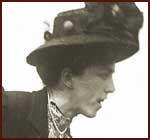
|
Rural radicalism had centred on the tenant farmers, and successive Liberal
governments did much to advance their interests. By 1910 the tenant farmers’ demands
had been largely satisfied. As attention shifted to the interests of farm
servants the limits of rural radicalism became more obvious.
The Turra Coo
In 1911, David Lloyd George, the Liberal Chancellor of the Exchequer,
introduced a National Insurance Act. This required contributions from both
employers and employees. Owner and tenant farmers in the North East of
Scotland disliked the policy.
- In 1913, Robert Paterson of Lendrum, Turriff, had a cow impounded
by the Sheriff. He refused to pay his employer’s National Insurance
contribution
- An attempt to auction the cow in the town square at Turriff led to
a riot
- Aberdeen Mart refused to sell the beast. It was bought by local farmers
and returned will full honours to Paterson
- Effigies of both Lloyd George and Mr Cowan, the local MP, were burnt
- Surprisingly, farm servants supported the farmers in what was seen
as a great local victory against the state.
Post-1918
After 1918, rural politics became increasingly conservative because:
- Tenant farmers had achieved their demands
- The rise of Labour threatened land nationalisation
- The agricultural depression encouraged protectionist sentiment:
a widespread wish to keep the economy exactly as it
was. This wish favoured the Unionists (Conservatives)
- At this time, trade unionism, the engine of working class radicalism,
was weak.
There were few voices, like James Leatham in Turriff, to put a progressive
case.
James Leatham
James Leatham (1865 – 1945), writer and printer, was a confirmed
socialist.
- He campaigned for basic rights and an improvement in conditions for
the workers
- He championed such issues as the eight-hour day, state-owned industry,
and an improvement in education and housing conditions
- He was a friend and supporter of the pioneer socialist, William Morris
and lectured throughout Scotland and England
- He wrote and published extensively and founded Gateway, a monthly
periodical, in 1912
- He moved to Turriff in 1916, and became provost in 1933.
|





